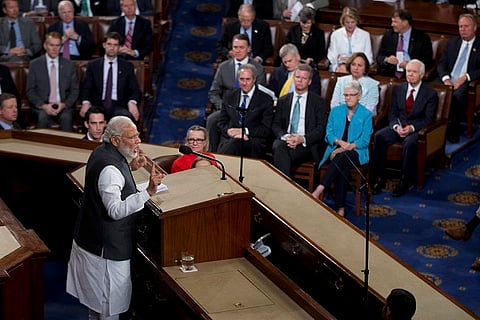

Wherever you looked in the speech, there was rigour, a new opening and wit. Security of sea-lanes in the Indian Ocean spoke to China gnawing away at the vast Indian Ocean and seas. Creating wealth was important, he said, but it was equally important to create value. Living in harmony with nature comes naturally to Indians opened the floodgates for solar technology and green cities – India was aiming for a hundred he said. India is a market for jobs just like America was an interesting fillip to parity. Hate, violence, murder and terrorism whether it is called the Lashkar-e-Toiba (LET), Taliban or ISIS, were all part of the same hydra said the leader of the world’s largest democracy. And then came one clincher. “A strong India is in America’s strategic interest.”
This was no begging or whining and India was far from the moralising and scolding that generally passes off as national interest. In the 44 minutes that Prime Minister Narendra Modi had addressed the joint session of the US Congress he sketched a new outline for India – one that is young, talented and ambitious, an India keen to fight for its place in the world. American lawmakers stood up nine times to give him a standing ovation and interrupted his speech 66 times to clap. You can’t script applause standing or sitting.
Covering speeches and reporting on bilateral meetings is par for the course for journalists. I have heard speeches, reported about them and also written them. Rarely if ever have I heard anything like what Modi delivered on Wednesday as he spoke to Americans and beyond them to issues that bind and separate both our democracies. Terrorism was never more than a few sentences away from the extempore oratory and Modi said “traditional tools won’t work anymore” to deal with terror that is incubated in India’s neighbourhood. Translated that means get real America, you are not the only ones who have to fight terror. It was also a smart move to link American sacrifices in Afghanistan and India’s work in building that country back. Herat, Arlington cemetery and then the address to America’s lawmakers – join the dots in a speech peppered with the importance of a global response to local terror and private suffering of families.
How often have we heard an Indian Prime Minister speak so decisively for India?
There was humour, wit and even a jibe when Modi said even though 30 million Americans practice Yoga – more than the number that bends for a curved ball – India had not claimed intellectual property rights (IPR) on the practice! New Delhi and Washington have been locked in internecine IPR fights, with some of them reaching the World Trade Organisation (WTO) for adjudication. The speech also had delectable local terms. It was ‘railroad’ not trains, ‘fall’ not autumn. Details matter – they were all taken care of. Whoever is writing the first drafts of these speeches is a sophisticated seeker of terms and arranger of words and ideas.
So what did Congressional engagement achieve? In immediate terms probably not much. Such speeches are not meant to bring back contracts. All understand that stirring speeches cannot make a country economically or militarily strong. What Modi achieved was to drive up India’s hopes and aspirations by framing India’s strengths not just for its market potential but also for its strategic position the east. Looking eastward from India brought Indians to California where American innovation and technology and the brilliance of Indians met naturally, Modi said to yet another round of applause.
The other Modi was routine or what the Americans would say regular – photo-ops and one-liners. This one was looking for American support for India’s claim for membership to the Nuclear Supplier’s Group (NSG). This 48-member NSG is an exclusive club that allows its members to get easy access to and trade in technology. Modi got reassurances from American President Barack Obama about American support. That will translate to little as China is guarding doors, windows and pipelines to keep India out. American support for India’s quest for a permanent seat at the United Nations Security Council (UNSC) is also poppycock.
Other agenda items were movement forward on the civilian nuclear deal, some key defence agreements, easier visas for Indian professionals and exchange of terrorists, the climate treaty, among others. This is think tank substance, neither here nor there and lingering forever with new names, tags and many seminars. This humdrum is what explains the pre and post commentary about Modi’s visit. The American President was batting for history and Modi had travelled to his town to connect with the transition. This is not the stuff of headlines. Transition is the insistence on words like consolidation, continuum, process and protocols, roadmap, taking cognizance of, building blocks, frequent visits, Sherpa level talks, so on and so forth. I have also written drafts of treaties and agreements to tell chalk from cheese.
Where does that leave India? As Modi eloquently said there is a new symphony in play. Just ahead of the speech industrialist Anand Mahendra captured it all in a tweet, “A leader earlier denied a visa, now about to address a joint session of Congress. A remarkable moment in geopolitics.” It was a moment for all Indians - detractors, critics et al. There were two Narendra Modis in Washington this week. There are also two Narendra Modis in India – one who interacts with New Delhi and the other that India reacts to. For India’s sake the two will have to meet.
PS: As I was listening to Modi speak, I thought about American Presidential hopeful Donald Trump. I bet there were others in that room wondering what they had done to deserve the man with the funny hairdo.